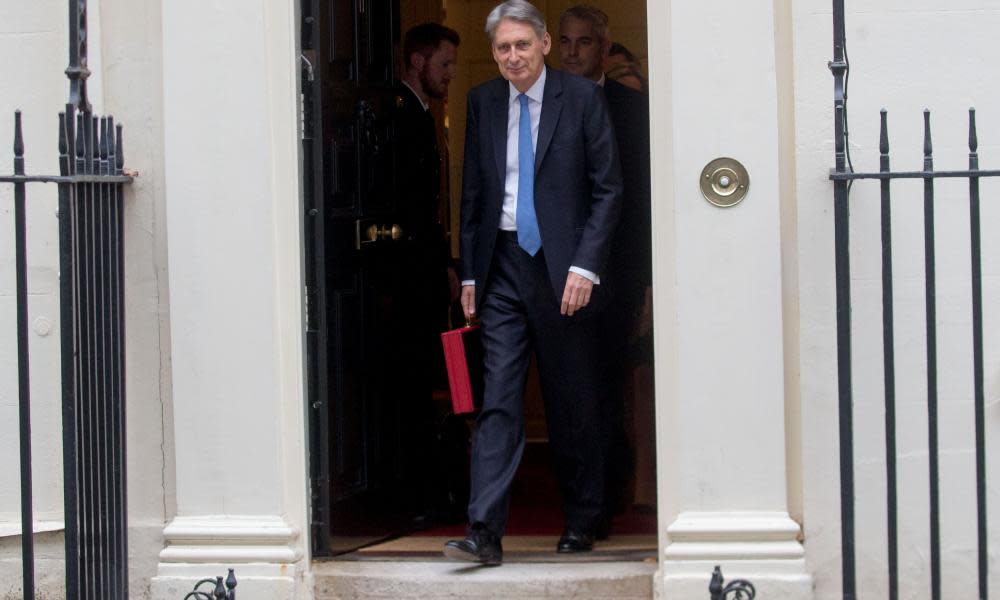Hammond safe at No 11 after 'clanger-free' budget

Just days ago, Philip Hammond was battling for his political life amid television gaffes and pressure from Brexit-supporting MPs who considered him – and the Treasury – way too gloomy about Britain’s prospects after leaving the EU.
As he stood up to deliver a budget that most agreed posed tricky challenges, bookies were taking bets on how long it would be until this chancellor was shunted out of No 11.
By the time he had sat down, to a pleasant reaction from Tory MPs who carried their appreciative nods with them across the parliamentary estate, his government position was safe for the time being.
“He has gone from Eeyore to Tigger,” said Rob Halfon, a Conservative MP who has not shied away from criticising the government.
It wasn’t that this was a blockbuster budget by any means. In fact, the most exciting-sounding of Hammond’s announcements – such as those on stamp duty and more cash for the NHS – fell well short once journalists were able to pore over the red book and the accompanying report from the Office for Budget Responsibility.
On abolishing the property tax for most first-time buyers, the OBR warned that the measure would only result in an extra 3,500 people making a purchase, but still push up prices enough to have a minimal impact on affordability.
Meanwhile, some of the most senior figures in health – the chairman of NHS England, Sir Malcolm Grant, and the national medical director, Sir Bruce Keogh – offered an ominous assessment. They claimed the money did not close the funding gap and ought to trigger a debate about what services the public should expect from their health service.
But Hammond was able to offer just enough to satisfy the group of people most important when it comes to his political future: Tory MPs.
First was the impact of his Brexit happy pills: after weeks of criticism from leave campaigning MPs, who saw Hammond as the poster boy for soft Brexit and who bemoaned what they saw as his gloomy outlook, the chancellor responded with a smile.
His promise to “seize the opportunities”, even while listing dismal growth forecasts, will have pleased backbenchers.

Then there was the fact that “fiscal Phil” was ready to loosen up, allowing borrowing and using “headroom” to put together a budget with a short-term “net giveaway” bigger than ever offered by his predecessor, George Osborne. That allowed him to please MPs who wanted to see more investment, and the party respond to the challenge laid down for them in the June general election.
The transformation was noted by Halfon, the chair of the education select committee who had been so unconvinced that Hammond would deliver that he published his own “budget for workers” on Tuesday.
The former skills minister admitted he had not got everything on his wishlist (which included cutting national insurance for the low paid) but said the chancellor was headed in the right direction.
“Twenty four hours ago, I didn’t think it would be radical at all,” said Halfon, welcoming the continued fuel duty freeze, money for the NHS and a boost for skills training.
Others who have been critical of the government, such as Heidi Allen, were happy with a £1.5bn package for universal credit, although Hammond failed to reverse Osborne-led cuts to the benefit’s work incentives. And at least some business groups felt this was a “business-friendly budget”.
But the most important thing Hammond had to do in order to fight another day as chancellor was to avoid any clangers. The minister knew he could not repeat the disaster of March, when his plan to raise national insurance for the self-employed caused such outrage it quickly resulted in an embarrassing U-turn. Nor could he make any silly slip-ups like the one on Sunday, when he told the BBC’s Andrew Marr that there weren’t any unemployed people.
And on that, he succeeded, by swerving the potential political car crash of a decision to reduce the VAT threshold for businesses, and not offering measures to improve intergenerational fairness that would inflict pain on the older voters who make up much of the Tory base.
Clanger free, optimistic enough, and with a little less fiscal responsibility than he would like to convey, Hammond has got away with it – at least for now.

 Yahoo News
Yahoo News 
